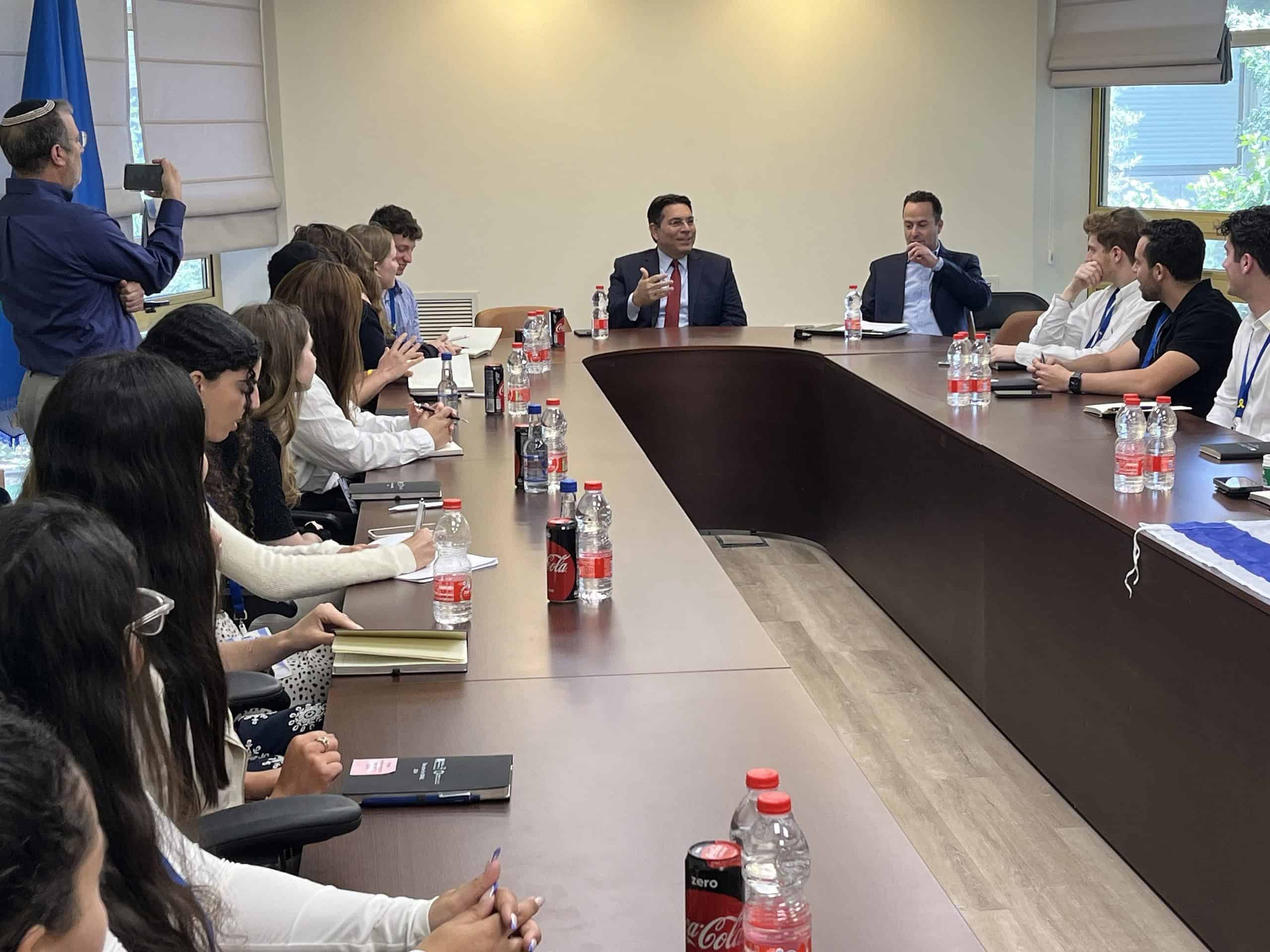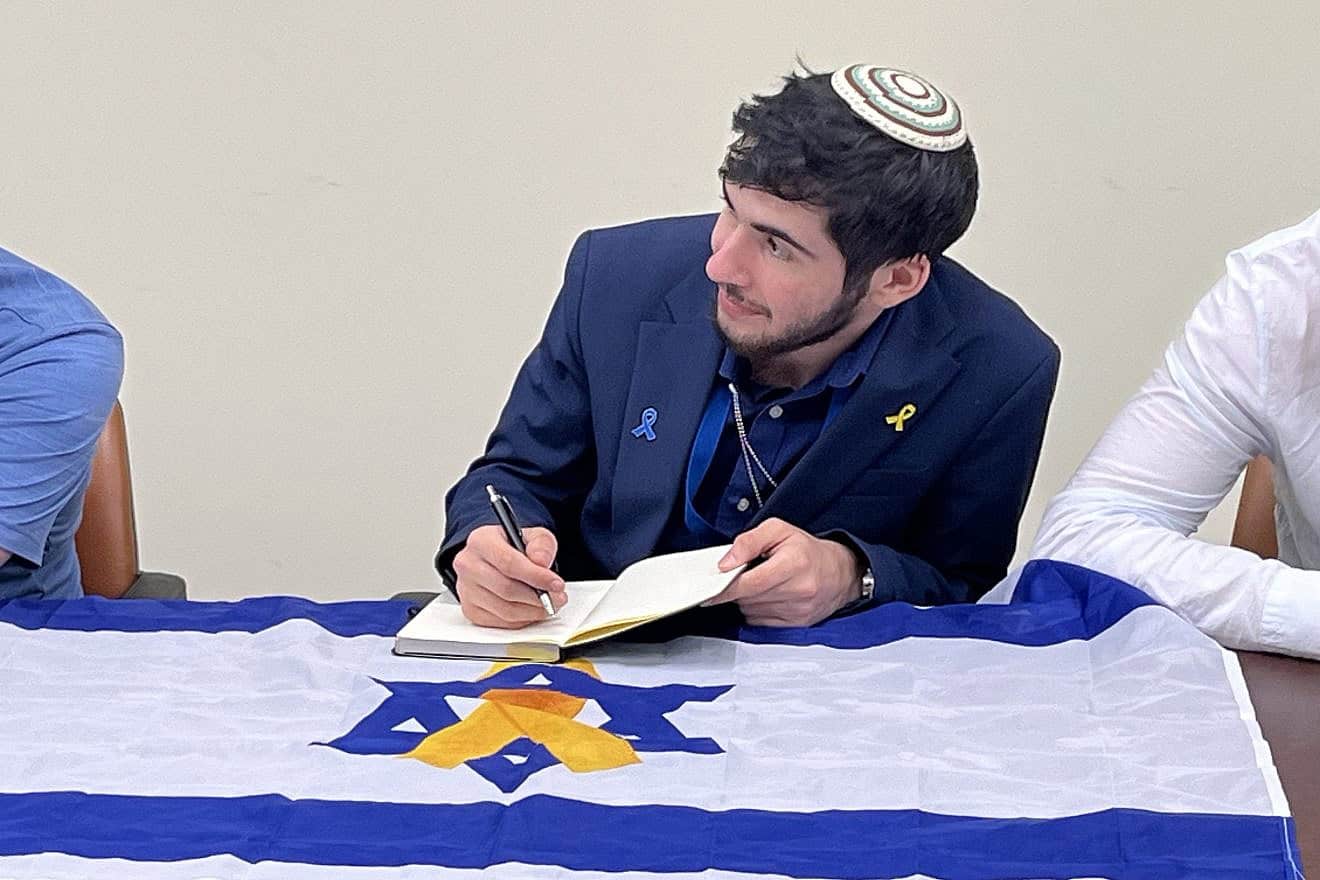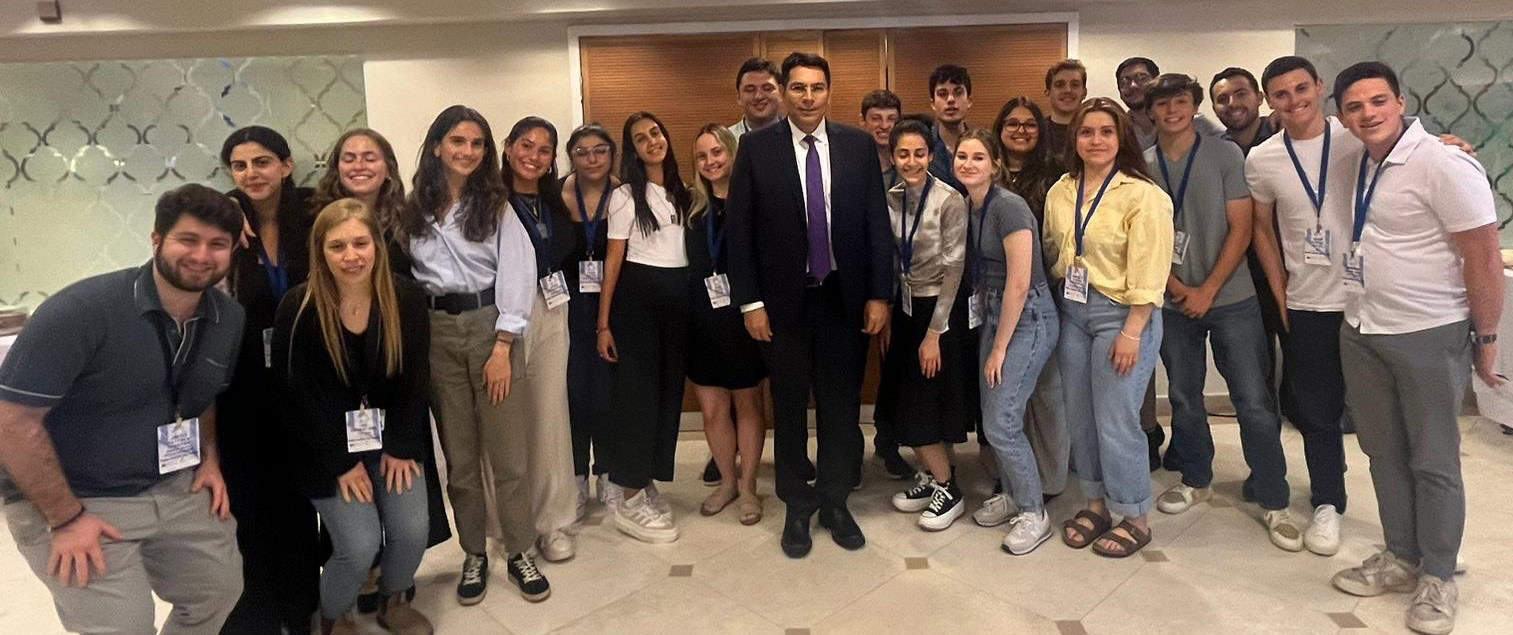“There is another front to this war, and it’s happening right now in America.” This is according to Jason Diebner, a student at the University of Texas at Austin currently in Israel with two dozen Jewish student leaders representing schools across North America who are experiencing antisemitism up close on campus.
The students are meeting with top Israeli officials, gathering firsthand testimonies about the Hamas terrorist attacks on Oct. 7, meeting with hostage families and visiting the southern border communities that were affected that Black Shabbat by the massacre of 1,200 perpetrated by a proxy of Iran.
The mission is being sponsored by Hasbara Fellowships and IsraelAmbassadors.com.
On Thursday, the students were hosted in the Knesset by former Ambassador to the United Nations Danny Danon to learn the facts about a variety of topics surrounding the war that are often misconstrued or misrepresented, including issues of humanitarian aid to civilians in the Gaza Strip; the situation on Israel’s northern border with another Iranian-backed terrorist proxy, Hezbollah; the status of Judea and Samaria; and other relevant topics.
Diebner told JNS that “the world had Holocaust deniers, and now we have Oct. 7 deniers. But now that I was in Kibbutz Nir Oz and saw what happened, I have a personal testimony and can go back to school and share what these Hamas animals did.”
Diebner said people don’t realize how unsafe Jewish students feel on his campus; he himself was verbally and physically assaulted by an Arab while wearing an Israel Defense Forces sweatshirt. He has also heard chants from anti-Israel/antisemitic protesters such as “We are Hamas” and “Go back to Europe.”

He added that many of those arrested by police for the violence weren’t even students but outsiders who arrived to spread hate. Some of those arrested were found to have weapons such as guns and knives, he said.
In terms of the Israel trip, Diebner said “to come here at a time when I feel unsafe at school and have the ability to be with my people, and to learn everything I can and have the tools to come back and fight for the Jewish people back at home, is everything I could have wanted.”
‘The reality on the ground’
Shaya Keyvanfar, a sophomore at the University of California, Berkeley, told JNS she sees so much ignorance from the anti-Israel protesters on her campus about the situation, including from some of the Jewish students who truly believe that they are doing the right thing supporting Palestinians in Gaza and chanting against Israel.
She said the situation on her campus “is very concerning—mostly, the fact that people don’t know what they are saying. They are shouting to ‘globalize the intifada’ and [calling for an] ‘intifada revolution.’”
Keyvanfar added that “a big chunk of the anti-Israel protestors are violent. Someone told us we should be tortured [for supporting Israel].”
She shared that she was part of a group that tried to host an Israeli attorney as a speaker on campus, but a riot broke out, putting the event to a halt. One of her friends was attacked and strangled by a member of the mob.
Keyvanfar said those levying false accusations against Israel, such as labeling the country as an apartheid state, need to come to the Middle East and get the facts.
“It’s jarring when you realize how little these people know. I wish we could sponsor them to come to Israel, and come learn and speak to the Arabs and Jews who live here and understand what is happening, so they can see the reality on the ground.”

Joshua Shain, an undergraduate at Columbia University in New York—the epicenter of the recent anti-Israel tent encampments—told JNS that he hasn’t been back to in-person learning since before Passover since “Jews do not feel and were not physically safe on campus.”
Columbia has offered a virtual learning option for those unwilling to arrive to class due to safety concerns.
When asked what the difference was over the past few months compared to the start of the war, when antisemitism began to rear its ugly head after Oct. 7, Shain replied that “between the fall semester and the spring semester, the anti-Israel protesters have gotten a lot more aggressive. They’ve gone from protests, which were somewhat contained, to the encampments and seizure of Hamilton Hall,” referring to the school’s administration building. “The encampment period brought with it an explosion in physical violence.”
He said that as a result of the situation, “anyone who I have talked to who has visited Israel, even during war, felt safer here than in America.”
When asked if he would consider making aliyah as a result of the situation, he said that he has—and he is not alone.
Moving to Israel, he said, is “in the back of the mind of every Jew—not just college students, but the tearing down of [hostage] posters, wishing death on the hostages, we now understand … we are not fully safe in America, no matter how assimilated we thought we were.”

‘Our voice must be heard’
Knesset member Danon encouraged the students to be prepared for what could be a turbulent semester on campus this fall.
“It’s not going to get easier. Israel has enemies we must defeat, and it takes time,” he said. “This will still be an issue for you during the fall semester. You have to be prepared to fight against it. You must get your messages out. Our voice must be heard.”
To JNS, he said: “The students here on their Israel trip are experiencing that despite the challenges, we are strong, we are united, and we are standing behind them. They are not alone.”
Alan Levine, executive director of the Hasbara Fellowships, added that “Israel is not only fighting a physical war on its borders, the Jewish people are facing a worldwide war of antisemitism. And nobody is feeling it more than Jewish university students. We have to recognize that we are all connected, and as Jewish students, we need to come to Israel to educate ourselves and stand together in solidarity as we prepare to fight back on our campuses next school year.”


























